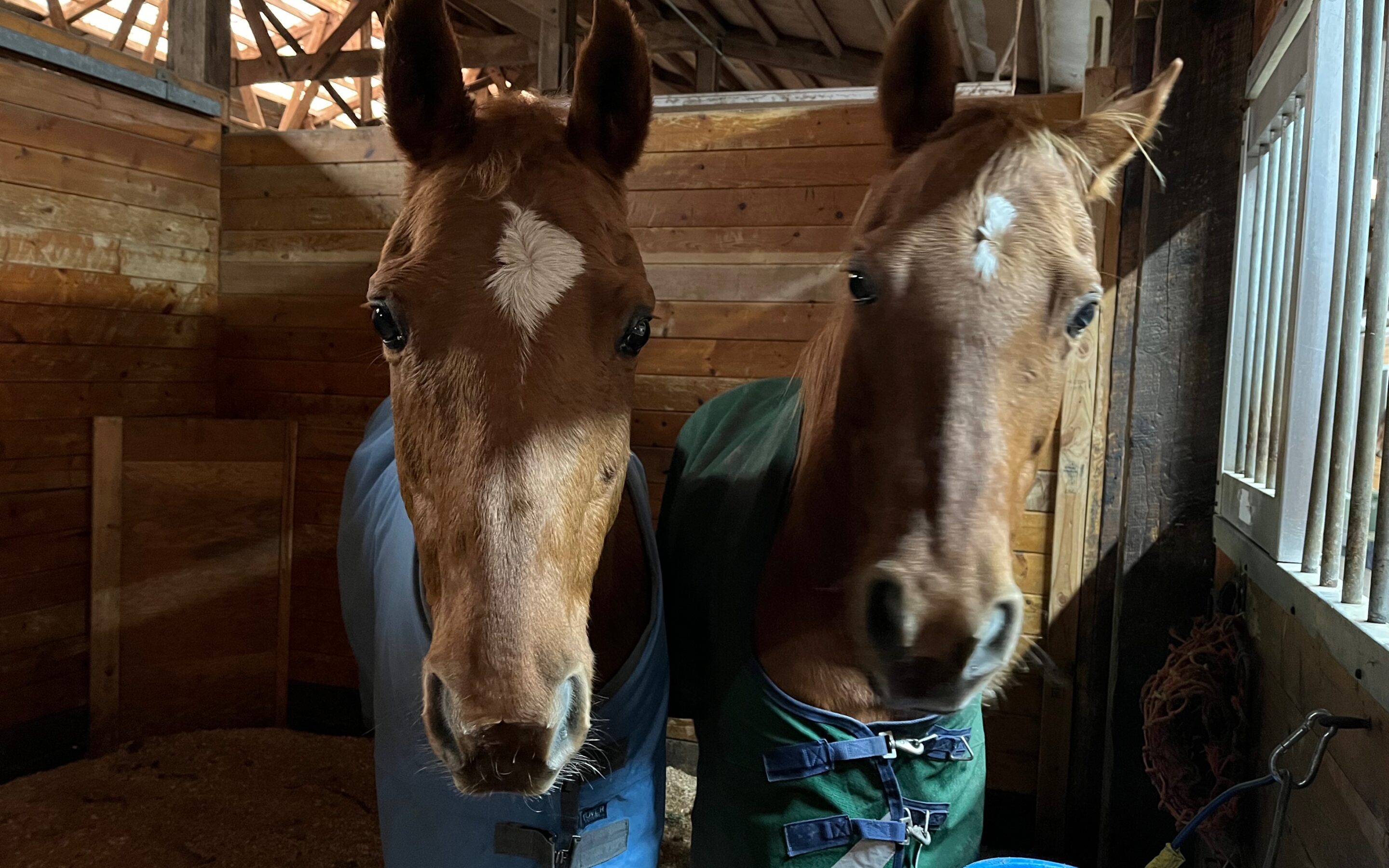Beva (“Nickers”) and Aspen (“Knees”) were owned by an elderly woman who collapsed in her home and was hospitalized in early October 2022, leaving the horses to be cared for by a neighbor. Animal Control was called out about the horses’ condition, but found hay, water, and shelter on the property and a pair of horses that seemed pretty spry. They gave the neighbor feeding instructions and told the individual to contact them if they ran into any issues. Three weeks later, the neighbor called Pasado’s, saying that they couldn’t care for the horses and that one of the mares was down. Pasado’s immediately tried to get a vet out to help, but no one could come until after the weekend. So they called SAFE, hoping we could help. The owner’s case was being managed by Adult Protective Services, and Pasado’s worked with the owner’s social worker to get her to agree to sign the horses over to SAFE, which thankfully she did.
Beva was extremely emaciated, and it’s fair to say that she was rescued just in the nick of time. Her first night at SAFE was pretty harrowing – Beva didn’t eat or drink anything we offered her, she just laid down and stayed down. She was able to stand up twice but she just collapsed back to the ground each time. She didn’t appear distressed; just kind of “done.” At 3am that first night, we found Beva cast in her shelter, meaning she had laid down with her hind legs right up against the wall, and could not get back up. We were able to flip her over and free her from the wall. All the while her sister Aspen kept watch over her. The food we’d provided did get eaten but our assumption was that Aspen was the only one eating.
Beva survived that first night, and our vet was out in the morning to run bloodwork on both mares, Beva’s showed no indication of inflammation or infection, but she did show liver enzyme changes, likely due to her emaciation, and that could result in sudden death. She was also dehydrated. Dr Lewis said that we could opt for hospitalizing her and using a feeding tube…but beyond that, Beva had to decide to start eating. So we were instructed to try feeding her 1.5 lbs of our alfalfa every three hours for the next 24 hours. And we were to try to get her to drink by offering her sweet water and wetting down the alfalfa. She was offered the alfalfa and seemed mildly interested in it. But she ate SO slowly, so we had to separate Aspen so she wouldn’t eat her sister’s food.
As the day and night went on, Beva seemed to decide that our alfalfa hay was actually pretty tasty…! Soon, she was polishing off her meals and nickering for more. They were fed every three hours through the night, and never once found her lying down. The next day she began venturing out of her shelter to stand with her sister, and appeared much brighter. This upswing continued through the weekend, and when Dr Lewis came out for a recheck, she was pleasantly surprised to see a much improved Beva. New bloodwork showed that her liver enzymes were headed in the right direction. We began feeding them every 4 hours, and gradually increasing the amount of hay at each feeding. Soon we were feeding every six hours, and finally, they were onto a “normal” feeding schedule that required no more late night visits. We’d been warned that Beva wouldn’t be out of the woods for 14 days, but she passed that deadline with flying colors, and continued to regain her weight and her health.
Beva and Aspen were very close, and gave each other a great deal of comfort. As Beva recovered, the two mares stayed close to one another, sharing a paddock by day and a double stall by night. They always had a nicker or two for passers by, and appreciated pats, scratches, and being told how lovely they both were.
Beva and Aspen survived to be rescued, but their neglect had effects that wouldn’t go away. For Beva, it was colic. In December 2022, she suffered her second bad episode. She could barely stand, she just kept dropping to the ground and refusing to get back up. Banamine, which usually eases a colicking horse’s pain, had no effect. Ultrasound revealed that the walls of her small intestine were hugely swollen and her motility was shutting down. She was in a lot of pain, and it was about to get much worse. There was nothing we could do.
For Aspen, her troubles started a few days before Beva’s colic, when we noticed that she was much more lame than she had been. Watching her struggle to compensate for the lack of mobility in her front legs was terrible. Maybe it was the cold weather, maybe she slipped at some point, or maybe she just couldn’t do it anymore. We promised when we rescued her that we would only ask her to stay with her sister if she was comfortable. And clearly she was not.
So we made the achingly awful decision to let them go together. And as much as it hurt to make that choice, it would have been far more painful to keep them going or to separate them. So they left us together, and it was peaceful and quiet and neither of them knew that the other was going away.
Beva and Aspen were truly rescued by SAFE, and we worked our very hardest to give them a better life. It’s unlikely that Beva would have survived another day had we not taken her when we did. Aspen was one of the bravest horses we ever met, and we’ll never forget how determined she was to get into our trailer, even though stepping up was hard. The two sisters comforted each other and were so happy together. Losing them was heartbreaking, but we’re so glad that we were able to know them. They were special. Rest in peace, Nickers and Knees. We will always think of you, and always love you.


